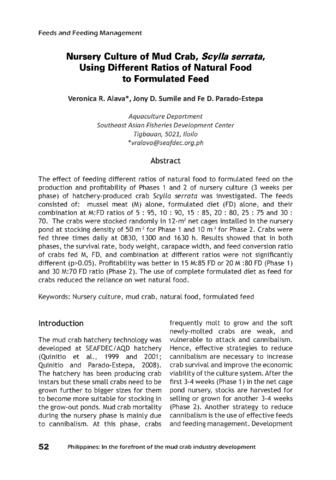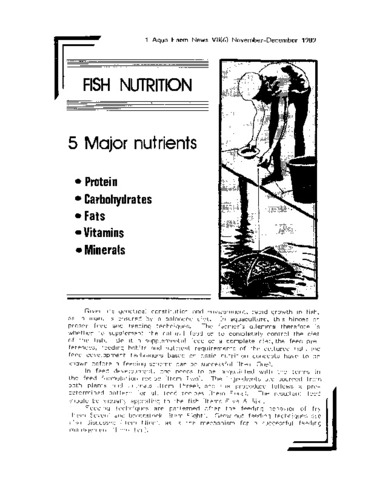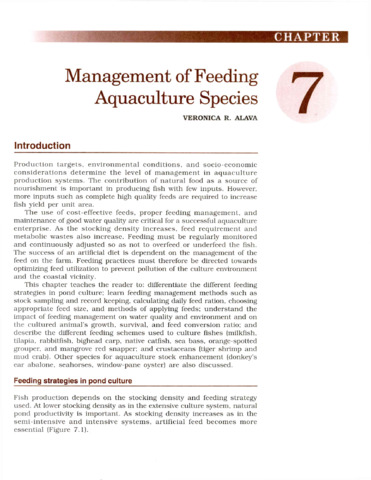| dc.contributor.author | Eusebio, Perla S. | |
| dc.contributor.author | Coloso, Relicardo M. | |
| dc.contributor.author | Mamauag, Roger Edward P. | |
| dc.contributor.editor | Rimmer, Michael A. | |
| dc.contributor.editor | McBride, Shannon | |
| dc.contributor.editor | Williams, Kevin C. | |
| dc.date.accessioned | 2015-10-14T00:32:16Z | |
| dc.date.available | 2015-10-14T00:32:16Z | |
| dc.date.issued | 2004 | |
| dc.identifier.citation | Eusebio, P. S., Coloso, R. M., & Mamauag, R. E. P. (2004). Apparent digestibility of selected feed ingredients in diets for grouper (Epinephelus coioides) juveniles. In M. A. Rimmer, S. McBride, & K. C. Williams (Eds.), Advances in grouper aquaculture (pp. 75–78). Canberra: Australian Centre for International Agricultural Research. | en |
| dc.identifier.isbn | 9781863204385 | |
| dc.identifier.uri | http://hdl.handle.net/10862/2413 | |
| dc.description.abstract | This study was conducted to determine the quality of selected feed ingredients as protein sources in grouper diets, based on their nutrient composition and apparent digestibility coefficients for dry matter (ADMD) and crude protein (APD). A total of 56 juveniles were used for the 1st batch of test ingredients (Chilean fish meal, white fish meal, shrimp meal, defatted soyabean oilmeal, white cowpea meal and ipil-ipil leaf meal). 54, 72 and 48 juveniles were used for the 2nd, 3rd and 4th batches of test ingredients (squid meal, local meat and bone meal, meat solubles, soya protein concentrates and rice bran; tuna fish meal, imported meat and bone meal, blood meal, maize gluten meal and wheat flour; and poultry feather meal, lupin seed meal and maize germ meal, respectively). Apparent digestibility coefficients were measured in vivo. The apparent digestibility coefficients for ADMD ranged from 37-99%. Squid meal and meat solubles had the highest coefficients, whereas blood meal had the lowest. The APD of all feed ingredients tested were relatively high (79-99%), except for rice bran (43%) and blood meal (15%). ADMD values varied with the levels of fibre and other carbohydrate substances in the feed ingredients. Groupers could utilize dietary protein efficiently regardless of whether it was of animal or plant origin. High APD values were generally obtained in feed ingredients with high protein content. Low digestibility coefficients for feed ingredients could also be attributed to the processing methods used in their preparation. | en |
| dc.language.iso | en | en |
| dc.publisher | Australian Centre for International Agricultural Research | en |
| dc.relation.ispartofseries | ACIAR Monograph 110 | en |
| dc.subject | Vigna unguiculata | |
| dc.subject | Acetes | |
| dc.subject | Leucaena leucocephala | |
| dc.subject | Oryza | |
| dc.subject | Epinephelus coioides | |
| dc.subject | Glycine max | en |
| dc.subject | Groupers | en |
| dc.title | Apparent digestibility of selected feed ingredients in diets for grouper (Epinephelus coioides) juveniles | en |
| dc.type | Book chapter | en |
| dc.citation.spage | 75 | |
| dc.citation.epage | 78 | |
| dc.subject.asfa | animal nutrition | en |
| dc.subject.asfa | growth rate | en |
| dc.subject.asfa | Fish meal | en |
| dc.subject.asfa | nutritive value | en |
| dc.subject.asfa | digestibility | en |
| dc.subject.asfa | fats | en |
| dc.subject.asfa | proteins | en |
| dc.subject.asfa | feeding experiments | en |
| dc.subject.asfa | feed composition | en |
| dc.citation.bookTitle | Advances in grouper aquaculture | en |



